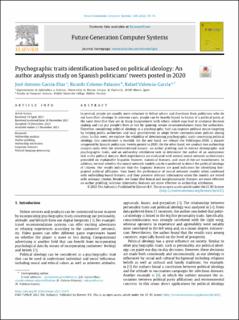| dc.contributor.author | García-Díaz, José Antonio | |
| dc.contributor.author | Colomo-Palacios, Ricardo | |
| dc.contributor.author | Valencia-Garcia, Rafael | |
| dc.date.accessioned | 2022-10-17T14:49:09Z | |
| dc.date.available | 2022-10-17T14:49:09Z | |
| dc.date.created | 2022-02-02T09:41:13Z | |
| dc.date.issued | 2022 | |
| dc.identifier.citation | Future generations computer systems. 2022, 130, 59-74. | en_US |
| dc.identifier.issn | 0167-739X | |
| dc.identifier.uri | https://hdl.handle.net/11250/3026472 | |
| dc.description.abstract | In general, people are usually more reluctant to follow advice and directions from politicians who do not have their ideology. In extreme cases, people can be heavily biased in favour of a political party at the same time that they are in sharp disagreement with others, which may lead to irrational decision making and can put people’s lives at risk by ignoring certain recommendations from the authorities. Therefore, considering political ideology as a psychographic trait can improve political micro-targeting by helping public authorities and local governments to adopt better communication policies during crises. In this work, we explore the reliability of determining psychographic traits concerning political ideology. Our contribution is twofold. On the one hand, we release the PoliCorpus-2020, a dataset composed by Spanish politicians’ tweets posted in 2020. On the other hand, we conduct two authorship analysis tasks with the aforementioned dataset: an author profiling task to extract demographic and psychographic traits, and an authorship attribution task to determine the author of an anonymous text in the political domain. Both experiments are evaluated with several neural network architectures grounded on explainable linguistic features, statistical features, and state-of-the-art transformers. In addition, we test whether the neural network models can be transferred to detect the political ideology of citizens. Our results indicate that the linguistic features are good indicators for identifying finegrained political affiliation, they boost the performance of neural network models when combined with embedding-based features, and they preserve relevant information when the models are tested with ordinary citizens. Besides, we found that lexical and morphosyntactic features are more effective on author profiling, whereas stylometric features are more effective in authorship attribution. | en_US |
| dc.language.iso | eng | en_US |
| dc.publisher | Elsevier | en_US |
| dc.rights | Navngivelse 4.0 Internasjonal | * |
| dc.rights.uri | http://creativecommons.org/licenses/by/4.0/deed.no | * |
| dc.subject | authorship analysis | en_US |
| dc.subject | author profiling | en_US |
| dc.subject | authorship attribution | en_US |
| dc.subject | linguistic features | en_US |
| dc.subject | natural language processing | en_US |
| dc.title | Psychographic Traits Identification based on political ideology: An author analysis study on spanish politicians tweets posted in 2020 | en_US |
| dc.type | Peer reviewed | en_US |
| dc.type | Journal article | en_US |
| dc.description.version | publishedVersion | en_US |
| dc.rights.holder | © 2021 The Author(s). | en_US |
| dc.subject.nsi | VDP::Teknologi: 500::Informasjons- og kommunikasjonsteknologi: 550 | en_US |
| dc.source.pagenumber | 59-74 | en_US |
| dc.source.volume | 130 | en_US |
| dc.source.journal | Future generations computer systems | en_US |
| dc.identifier.doi | 10.1016/j.future.2021.12.011 | |
| dc.identifier.cristin | 1996797 | |
| cristin.ispublished | true | |
| cristin.fulltext | original | |
| cristin.qualitycode | 2 | |

